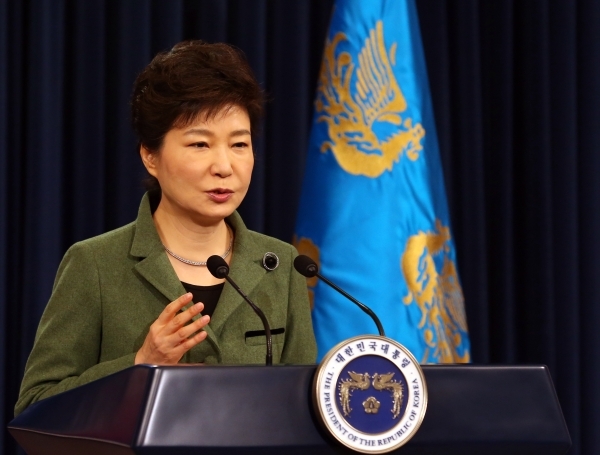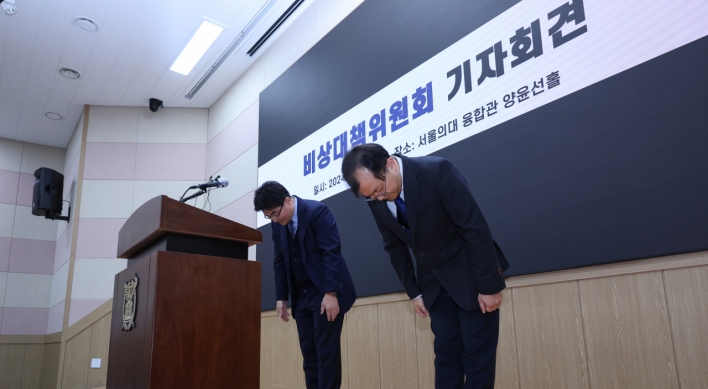S. Korea unveils 3-year economic innovation plan aimed at raising growth potential
By 박한나Published : Feb. 25, 2014 - 10:49

South Korea said Tuesday it will reform the country's overall regulatory system over the next three years to remove excessive red tape and bolster slumping corporate investment.
The government will also overhaul public organizations by tackling their worsening debt problems and other "abnormalities," and boost domestic demand in order to reduce the country's heavy dependence on exports, making its economy less susceptible to the ups and downs of the global market.
These objectives are part of the so-called "three-year economic innovation plan" that lays out a wide range of measures to push the economy for a "quantum jump" from what may be a protracted low-growth trend through restructuring and deregulation.
The announcement was timed with the first anniversary of President Park Geun-hye's inauguration and comes less than two months after the president mentioned the three-year innovation plan for the first time during her New Year's speech earlier this year.
"The growth potential of our economy has been weakening as it reveals its structural challenges, which have cumulated layer upon layer," said the finance ministry, which drew up the plan.
"If the current situation remains unattended, chances are our potential growth rate will slow, even making it hard for us to raise our per-capita gross income to over $30,000," it said. "The future three to four years will serve as a watershed moment that will determine the directions of our economy."
Regulatory reform is one of the key aspects that the government is pushing for under the innovation plan in line with its efforts to boost corporate investment and overall domestic demand going forward.
The government will apply a "cap" on the total number of regulations by obliging itself to ease or eliminate existing regulations when introducing new ones, a measure aimed at preventing the regulatory system from getting tough and complicated for businesses.
It will also review the current economy-related regulations "from the zero point" with a principle of removing what is regarded as excessive. In addition, it seeks to introduce a "negative list system" under which all regulations are removed except for specifically listed cases.
"We will, in particular, focus on investment-hampering regulations, excessive regulations compared with other competing countries and regulations not reflecting technological development and environmental changes," the ministry said.
This is part of government efforts to boost domestic demand through deregulation so that the country can be more secure against risks from global markets by reducing its heavy dependence on exports for economic growth.
In a related move, the government will nurture the local service sector, whose development has been stymied in large part due to conflicts and differences among stakeholders.
Health, education, tourism, finance and software were selected as "promising" service-sector areas, which will benefit from deregulation and "swift" and "tailored" support, the ministry said.
"Despite the fact that the service sector is a treasure trove of growth and job creation, we have made insufficient progress in improving key regulations due in part to conflict among stakeholders," the ministry said. "We are in a desperate situation where further delay would mean no future for our economy."
Another pillar of the three-year plan is rectifying "abnormalities" deeply rooted in our society and economy. The government, in particular, set its sight on the public sector being blamed for their growing debt problems along with chronic and deep-running lax management styles that fall behind the fast-changing business environment.
The government plans to normalize the public organizations by urging them to sell assets, streamline business structures and introduce a cap on the total amount of debt that they can issue to bring their debt problems under control.
Overlapping or similar businesses will be streamlined and efficiency enhanced by introducing competition in the public sector that has been close to monopolistic.
Encouraging business start-ups and venture activities through expanded support is also a major part of the three-year plan as the government seeks to inject more vitality into the economy by bolstering entrepreneurship.
In order to create an "ecosystem" friendly to start-ups, the government said it will spend about 4 trillion won ($3.7 billion) over the next three years.
To bring ballooning household debt under control, the government set a target to lower the ratio of debt to disposable income by 5 percentage points by the end of 2017. The debt-to-income ratio stands in the upper range of 160 percent.
The ministry said that if these measures are carried out as planned, Korea can "be turned into an advanced economy" three years later by raising its growth potential to around 4 percent, increasing the annual per-capita income level to exceed $30,000 toward $40,000 and boosting its employment rate to 70 percent.
"To make a leap forward to an advanced economy and open an era of people's happiness, we need to make all-out efforts for economic innovation," the ministry said. "Execution is important to rectify (problems) one at a time based on our strengths and potential. (Yonhap)
The government will also overhaul public organizations by tackling their worsening debt problems and other "abnormalities," and boost domestic demand in order to reduce the country's heavy dependence on exports, making its economy less susceptible to the ups and downs of the global market.
These objectives are part of the so-called "three-year economic innovation plan" that lays out a wide range of measures to push the economy for a "quantum jump" from what may be a protracted low-growth trend through restructuring and deregulation.
The announcement was timed with the first anniversary of President Park Geun-hye's inauguration and comes less than two months after the president mentioned the three-year innovation plan for the first time during her New Year's speech earlier this year.
"The growth potential of our economy has been weakening as it reveals its structural challenges, which have cumulated layer upon layer," said the finance ministry, which drew up the plan.
"If the current situation remains unattended, chances are our potential growth rate will slow, even making it hard for us to raise our per-capita gross income to over $30,000," it said. "The future three to four years will serve as a watershed moment that will determine the directions of our economy."
Regulatory reform is one of the key aspects that the government is pushing for under the innovation plan in line with its efforts to boost corporate investment and overall domestic demand going forward.
The government will apply a "cap" on the total number of regulations by obliging itself to ease or eliminate existing regulations when introducing new ones, a measure aimed at preventing the regulatory system from getting tough and complicated for businesses.
It will also review the current economy-related regulations "from the zero point" with a principle of removing what is regarded as excessive. In addition, it seeks to introduce a "negative list system" under which all regulations are removed except for specifically listed cases.
"We will, in particular, focus on investment-hampering regulations, excessive regulations compared with other competing countries and regulations not reflecting technological development and environmental changes," the ministry said.
This is part of government efforts to boost domestic demand through deregulation so that the country can be more secure against risks from global markets by reducing its heavy dependence on exports for economic growth.
In a related move, the government will nurture the local service sector, whose development has been stymied in large part due to conflicts and differences among stakeholders.
Health, education, tourism, finance and software were selected as "promising" service-sector areas, which will benefit from deregulation and "swift" and "tailored" support, the ministry said.
"Despite the fact that the service sector is a treasure trove of growth and job creation, we have made insufficient progress in improving key regulations due in part to conflict among stakeholders," the ministry said. "We are in a desperate situation where further delay would mean no future for our economy."
Another pillar of the three-year plan is rectifying "abnormalities" deeply rooted in our society and economy. The government, in particular, set its sight on the public sector being blamed for their growing debt problems along with chronic and deep-running lax management styles that fall behind the fast-changing business environment.
The government plans to normalize the public organizations by urging them to sell assets, streamline business structures and introduce a cap on the total amount of debt that they can issue to bring their debt problems under control.
Overlapping or similar businesses will be streamlined and efficiency enhanced by introducing competition in the public sector that has been close to monopolistic.
Encouraging business start-ups and venture activities through expanded support is also a major part of the three-year plan as the government seeks to inject more vitality into the economy by bolstering entrepreneurship.
In order to create an "ecosystem" friendly to start-ups, the government said it will spend about 4 trillion won ($3.7 billion) over the next three years.
To bring ballooning household debt under control, the government set a target to lower the ratio of debt to disposable income by 5 percentage points by the end of 2017. The debt-to-income ratio stands in the upper range of 160 percent.
The ministry said that if these measures are carried out as planned, Korea can "be turned into an advanced economy" three years later by raising its growth potential to around 4 percent, increasing the annual per-capita income level to exceed $30,000 toward $40,000 and boosting its employment rate to 70 percent.
"To make a leap forward to an advanced economy and open an era of people's happiness, we need to make all-out efforts for economic innovation," the ministry said. "Execution is important to rectify (problems) one at a time based on our strengths and potential. (Yonhap)



![[Exclusive] Korean military set to ban iPhones over 'security' concerns](http://res.heraldm.com/phpwas/restmb_idxmake.php?idx=644&simg=/content/image/2024/04/23/20240423050599_0.jpg&u=20240423183955)
![[AtoZ into Korean mind] Humor in Korea: Navigating the line between what's funny and not](http://res.heraldm.com/phpwas/restmb_idxmake.php?idx=644&simg=/content/image/2024/04/22/20240422050642_0.jpg&u=)

![[Graphic News] 77% of young Koreans still financially dependent](http://res.heraldm.com/phpwas/restmb_idxmake.php?idx=644&simg=/content/image/2024/04/22/20240422050762_0.gif&u=)




![[Pressure points] Leggings in public: Fashion statement or social faux pas?](http://res.heraldm.com/phpwas/restmb_idxmake.php?idx=644&simg=/content/image/2024/04/23/20240423050669_0.jpg&u=)







![[Today’s K-pop] Stray Kids float teaser for Charlie Puth collaboration](http://res.heraldm.com/phpwas/restmb_idxmake.php?idx=642&simg=/content/image/2024/04/24/20240424050702_0.jpg&u=)